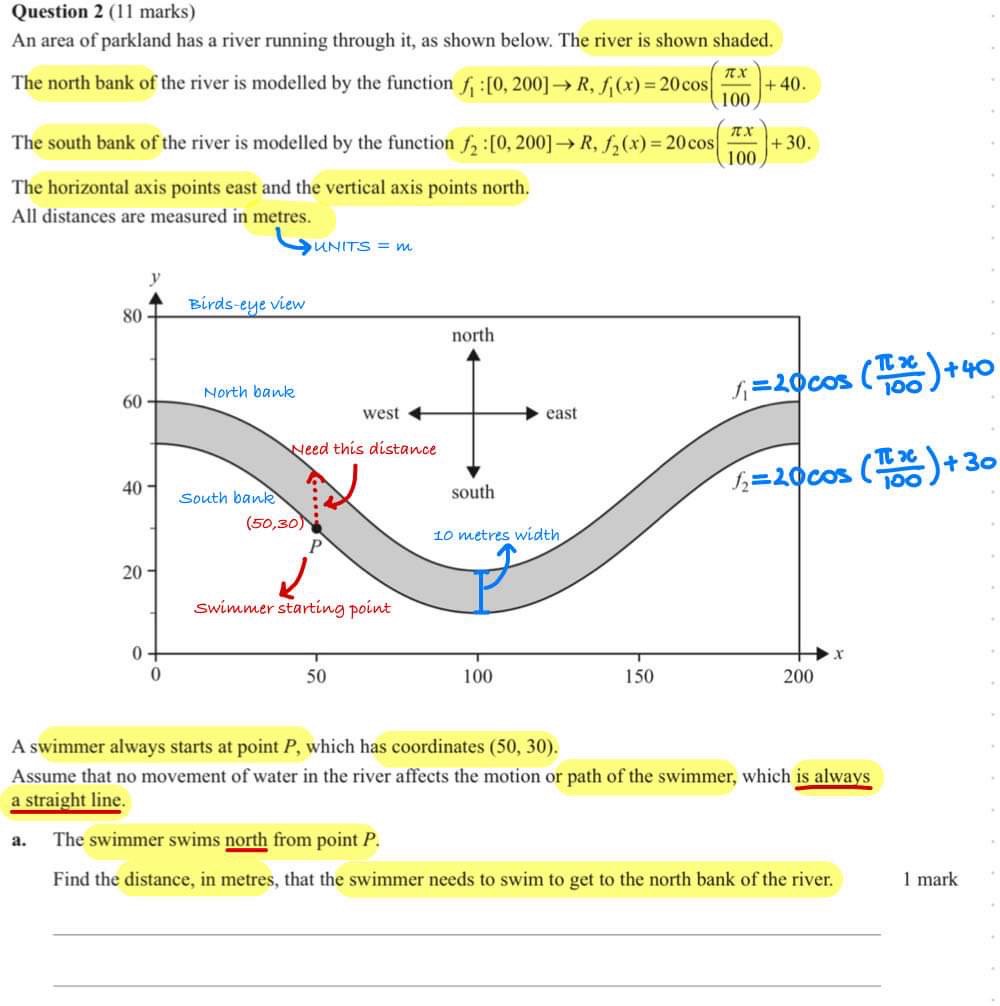Hi there! I'm Daniela, a VCE Maths Methods and Biology tutor on Learnmate. I graduated from John Monash Science School with an ATAR of 98.85 and scaled study scores of 49 for VCE Maths Methods and Biology, also achieving 45+ in Chemistry and Physics. I’ve been a passionate tutor for the past 3 years and I’m here to provide you with insights into how to set yourself up for success in VCE!
I am here to share strategies for tackling the most challenging questions in the VCE Maths Methods exam. With a strong academic background and years of tutoring experience, I'm excited to guide you through mastering these complex problems.
Annotate the Question: Focus on Key Information
Difficult questions often come surrounded by overwhelming amounts of information. Annotating the question and identifying key information, numbers, and units helps you focus on what truly matters. This is a skill to learn and practice however, it makes an enormous difference in your understanding the question and being able to break it down into the essentials. Here is an example of how you could annotate a question:

Decoding Complexity: Annotated Example of a Maths Methods Question.
Identify Key Concepts Being Tested
Difficult questions usually hint at key concepts they are testing. Identifying these concepts serves as your entry point into understanding or attempting the question. While this may require careful analysis, recognizing the central idea behind the question can guide your approach and simplify the problem-solving process. At a bare minimum, identifying the concept they are prompting you towards will allow you to get some relevant working on paper.
Use Your CAS Strategically in VCE Maths Methods
While a CAS (Computer Algebra System) can be a valuable aid, it should complement your understanding rather than replace it. You should still be able to work out the question by hand, but you then use the CAS for calculations or visualizations beyond your manual capabilities. Furthermore, you can use it as a tool to visualise complex equations, however, this is again as a tool, not a crutch. Over-reliance on the CAS can hinder your understanding and pose more challenges than solutions with more complex questions.
Sketch a Diagram or Graph Before Solving
Although this may be age-old advice, sketching a quick graph or diagram can make a world of difference in understanding the question. A visual representation can provide clarity, helping you grasp the intricacies of the question and formulate a more intuitive solution. Furthermore, it is often the key to understanding what is happening during complex, multi-part questions, especially when there are multiple unknown variables within the equations. Drawing diagrams also makes probability style questions easier to conceptualise and answer correctly.
Know Your Formula Sheet and Bound Reference Inside Out
It is essential for you to know and understand everything that is on your formula sheet and what you've written in your bound reference, otherwise it is essentially useless to you to use for a difficult question. Knowing and understanding every component empowers you to utilize these resources effectively. It will save you time, effort and stress to know exactly where particular information is and how to use it.
Trust the Process on Multi-Step Questions
This may be odd at first, but it is something I have noticed Maths Method students struggle with time and time again. The tricky questions in Maths Methods are designed so that students can not see every step they need to do until they get there. As you continue these questions, it may seem like you are going nowhere but this is where you trust the process. As you do each step, the next step will reveal itself. Too many students stop early or don't even attempt the question because they can not see the direction the question is heading towards. With this, you must also have confidence in yourself! This confidence is essential because in order to trust the process, you must be confident in knowing you have all the tools to do any question (you do!).
You can practise with past papers from the VCAA Maths Methods examinations page — working through previous Exam 2 extended-response questions is one of the best ways to build this confidence.
Final Tips for VCE Maths Methods Exam Success
In conclusion, mastering difficult questions in Maths Methods involves a combination of strategic annotation, conceptual identification, tool usage, visualization, resource familiarity, and unwavering confidence in the problem-solving process. Adopting these strategies will not only enhance your problem-solving skills but also empower you to confidently face the most challenging questions that Maths Methods throws your way. Happy problem-solving!
This blog is the second in a series dedicated to uncovering the essential skills and strategies necessary to succeed this year in VCE Maths Methods. You can read the first blog in this series here. Stay tuned for future blogs as we continue to dive deeper into this subject, aiming to equip you with a comprehensive toolkit for success.
Need help with VCE Maths Methods?
Learnmate's research shows that 70% of students who achieve ATARs of 99+ engage one or more tutors. A specialist VCE Maths Methods tutor can work through complex exam questions with you, identify where you're losing marks, and build the confidence Daniela describes above.
Browse VCE Maths Methods tutors on Learnmate — including 45+ study scorers and qualified teachers — or post a job on the Jobs Board and let tutors come to you.
This blog was written by Daniela L, a VCE Biology and VCE Maths Methods Tutor on Learnmate. Daniela is tutoring while studying a Bachelor of Advanced Science Research at Monash University. She graduated with a 98.85 ATAR, 45+ study scores in 4 subjects and has been supporting other students achieve their goals through tutoring for over 3 years.
You can view her profile and, subject to her availability, request Daniela as your tutor here.




